People who convey voices from the sea
People who convey voices from the sea
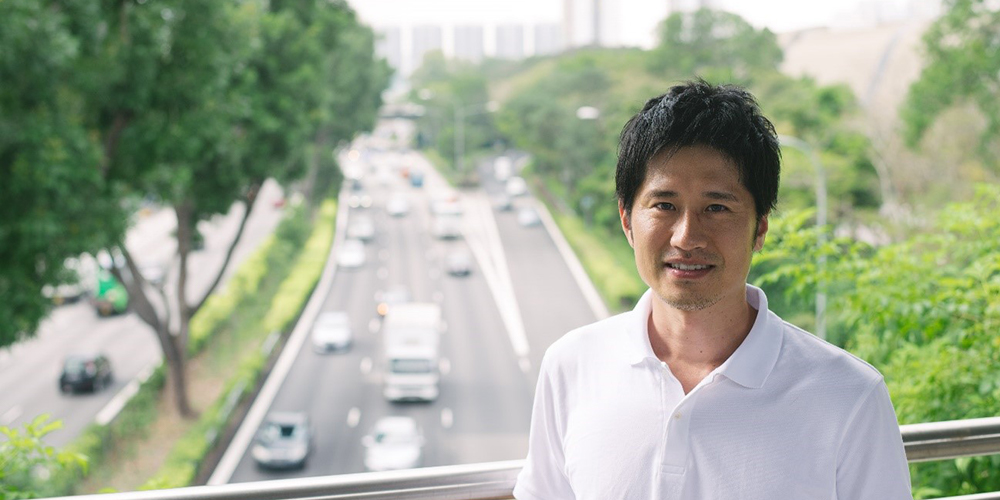
Understanding logistics from the perspective of urban planning and transportation planning
Associate Professor Takanori Sakai, Department of Distribution Information Engineering, Faculty of Ocean Engineering
Logistics in city planning/
?From the perspective of transportation planning
Associate Professor Takanori Sakai, Department of Distribution Information Engineering, Faculty of Ocean Engineering
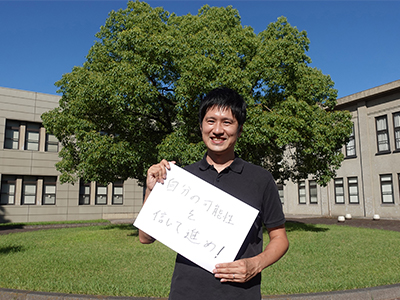
Biography
Takanori Sakai(Takanori Sakai)
Distribution Information Engineering Associate Professor
Graduated from the Department of Civil Engineering, Tokyo Institute of Technology.
Completed the master's course in the Department of Human Environmental Systems Engineering at the same graduate school.
From 2006 to 2007, he studied abroad at the University of California, Irvine.
Since 2008, he has been working at the overseas office of Almec Co., Ltd.
In 2017, he received a PhD from the Department of Urban Planning and Policy at the University of Illinois at Chicago.
A research institute in Singapore at the Massachusetts Institute of Technology
Through the Singapore-MIT Alliance for Research and Technology (SMART),
From April 2021, Associate Professor, Distribution Information Engineering, Tokyo University of Marine Science and Technology.
Takanori Sakai(Takanori Sakai)
Department of Logistics and Information Engineering
Associate professor
Graduated from the Department of Civil Engineering, Tokyo Institute of Technology, and completed the master's course at the same graduate school, Department of Human Environmental Systems Engineering.
From 2006 to 2007, he studied abroad at the University of California, Irvine. Since 2008, she has been working at the overseas office of Almec Co., Ltd.
In 2017, he received a PhD from the Department of Urban Planning and Policy at the University of Illinois at Chicago.
Through the Singapore-MIT Alliance for Research and Technology (SMART), a research institute in Singapore at the Massachusetts Institute of Technology,
From April 2021, Associate Professor, Distribution Information Engineering, Tokyo University of Marine Science and Technology.
- Q What department do you belong to?
↓
- The flow of "things" such as products and raw materials is inseparable from people's lives and various social activities.The Distribution Information Engineering Department is a department for learning the knowledge and technology related to such "flow of goods" (= distribution).
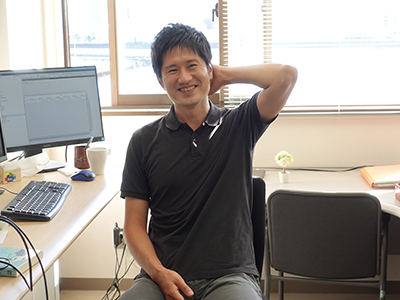
(in the laboratory) - Q What kind of classes do you teach?
↓
- The flow of goods is closely related to the formation of cities and the development of transportation.In the "distribution infrastructure planning (distribution information engineering department, XNUMXnd year)" in charge, the goal is to acquire knowledge about the history of urban planning, issues related to logistics in cities and transportation, planning, and statistical analysis methods. .Since ancient times, cities have been formed together with the development of transportation systems.For example, industries developed in the Gulf region because of the availability of low-cost marine transportation and the absence of land transportation costs.In other words, there is a close relationship between logistics costs and land use.Moreover, logistics development and globalization go hand in hand.For the rapid economic growth of developing countries in Asia, production bases will have access to global production and consumption systems by improving the convenience of marine transportation through container transport and by developing domestic backbone transportation systems (ports and highways). The background is that it has become possible.In class, we learned that logistics and transportation systems are the basis of urban formation and the international economy, what kind of city planning is related to logistics, what kind of systems exist in Japan, and what will happen in the future. learn when you are likely to need
- Q What kind of research are you doing?What do you find interesting about that research?
↓
- Logistics has aspects that should be understood from a business perspective and aspects that should be understood from a public policy perspective, but I mainly conduct research from a public policy perspective.Focusing on the evolution of transportation systems and their interrelationships with cities, I am particularly engaged in model development and policy analysis on urban logistics and land use, as well as urban logistics.In addition to the spread of new transportation modes such as self-driving cars and drones, in the face of the global COVID-19 epidemic, with the increasing number of online activities and the growth of e-commerce, research in this field is becoming increasingly important. I think it will be
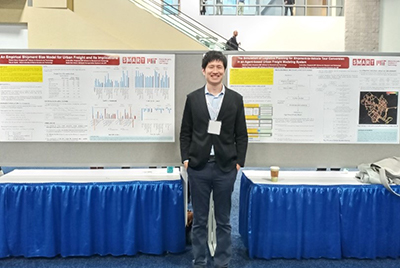
(At the presentation venue at the 2020 U.S. Transportation Research Commission)
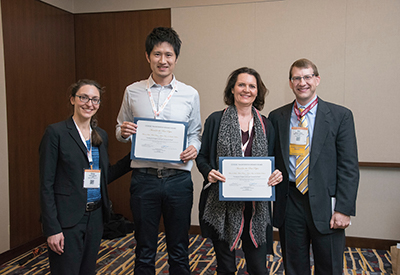
(At the 2018 TRB Urban Freight Transportation Board Best Paper Award Ceremony)
To talk a little about e-commerce, the spread of e-commerce in Europe, America and China is much more advanced than in Japan.As the market expands, there is growing interest in how cargo is moved and delivered within cities, as well as their efficiency and environmental impact, and the number of researchers is also increasing.In the United States, which was severely affected by the coronavirus pandemic, new purchasing systems, such as proxy shopping services using the cloud, have spread rapidly.Mobile kitchens are one of the changes, and chefs who can no longer work in restaurants are now cooking and delivering food in rental kitchens set up in residential areas.
There are some similarities with COVID-19, but new purchasing and logistics systems spread all over the world at a given moment. increase.I am currently collaborating with researchers from Europe, the United States, and Asia to analyze changes in urban logistics and land use related to the spread of e-commerce, targeting several major cities around the world, and to provide useful knowledge for society. I am trying to get
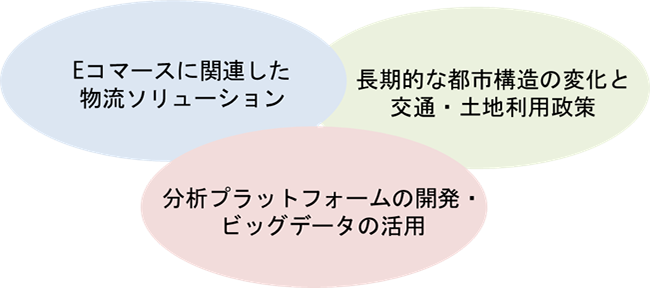
(Three interrelated research subjects)
- Q What inspired you to do this research?
↓
- Before embarking on research focused on logistics, he was primarily involved in transportation planning in Southeast Asia.By participating in the international supply system of goods (= global supply chain), developing countries have witnessed rapid changes in industrial structures and the nature of cities. I believe that one of the factors leading to my current research is that I have come to think that it is necessary to address various problems associated with the increase in systems and physical distribution.In fact, it was in 2013, when I joined the PhD program in the Department of Urban Planning and Policy at the University of Illinois, that I began to seriously pursue research in the field of logistics. After completing his PhD, he became a research fellow at the Massachusetts Institute of Technology in Singapore.
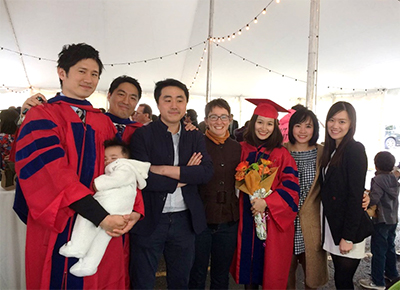
(On the day of the graduation ceremony, at the University of Illinois at Chicago.) - Q What number of SDGs is your research related to?How will your research help society?Also, what kind of occupation or work do you think it will lead to?
↓
- I think it is particularly related to "No. 11: Building a sustainable city."We are producing useful knowledge in the field of urban and transportation planning.Of course, I think it will be tied to the profession and work in that field.In the field of city and transportation planning, a deep understanding of nature and human society is required.In addition, I believe that the abilities of students to analyze, recognize problems, and solve problems through their research will be useful not only in my research field but also in society at large.
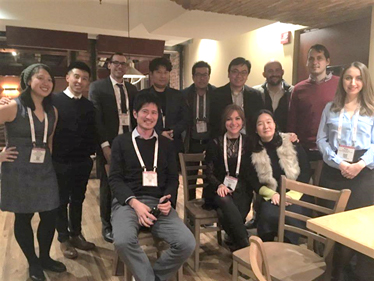
(After the conference, with old friends from the Institute of Transport Studies, University of California, Irvine (2006-2007))
- Q What are your future goals as a researcher?What kind of "dream" do you want to give to the world through your research?
↓
- I am not conscious of wanting to give “dreams” through my research.Through my research, I would like to produce as much knowledge as possible that is widely useful in human society.
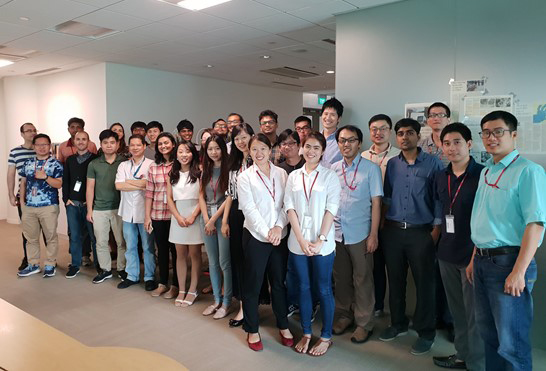
(Group photo at SMART where I was enrolled until 2021) - Q: Looking ahead to 2030, what kind of research would you like to do with incoming students?
↓
- In my research, I look at logistics from the perspective of city planning and transportation planning. need to be deepened.With students, I would like to analyze and discuss how changes in society and technology in the future will bring about changes in human society through logistics.








